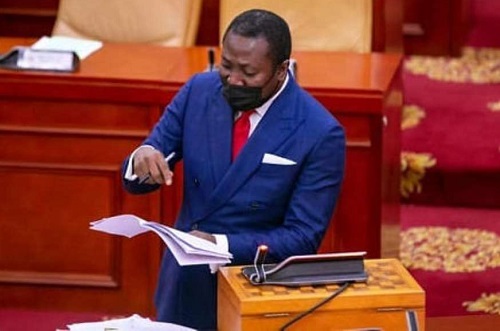
Since 1993, Parliament has never resorted to division in making decisions - Majority to Speaker
The Majority side in Parliament has stated that since 1993, Parliament has never resorted to a division in making decisions and was therefore wondering why the Speaker, Alban S.K. Bagbin, on Wednesday, decided to resort to a division in making a decision on the 2024 Budget Statement and Economic Policy.
Advertisement
To them, there was no such application to make the decision by resorting to a division and that the application, which was raised by Emmanuel Kofi Armah-Buah on account of Order 113(2) was a result of the challenge, where he called for a headcount.
There was no call for a decision by division and that it was the Speaker, who opted to go by that route.
To them, they are insisting that until the appeal for a headcount is dealt with, not the division that the Speaker had called last Wednesday, the 2024 Budget Statement and Economic Policy has been approved per what transpired in Parliament last Wednesday [Nov 29].
In a press statement signed and issued by the Deputy Majority Leader, Alexander Afenyo-Markin, the Majority side insisted that the decision by the Speaker of Parliament to call for a division "was certainly not the initial application" before the House.
"Despite the procedural objections raised, the Speaker declined to acknowledge these concerns and expressed his intention to proceed with a headcount as demanded."
They, therefore, want the Speaker to stick to the request of the headcount, and the not the possibility of resorting to a division, which the Speaker indeed called for, even though there was no such application before the House.
The Majority side stated: "Since 1993, Parliament has never resorted to a division in making decisions."
"The Majority concluded the choice for a division was unfair under the circumstance, leading to their decision to stage a walkout.
"It is essential to note that despite the Speaker's indication that the "ayes" had prevailed, and despite a petition presented to him, a petition that hadn't followed due process, the Speaker's initial ruling on the "ayes" retaining their advantage stands.
"Consequently, the budget has been duly passed until the appeal for a headcount is dealt with, not the division that the Speaker had called," the added.
Speaker Bagbin's position
Meanwhile, at Thursday's sitting of the House, the Speaker of Parliament, Alban S.K. Bagbin said the Budget Statement and the Economic Policy of the government for the year ending December 31, 2024 is still before the House.
He said the final decision on the budget statement would be taken next week, Thursday, December 7, 2023.He, therefore, directed the Business Committee of the House to reschedule the issue for next week.
Related article: Parliament to take final decision on 2024 budget approval next Thursday
Read the full statement by the Majority side below
STATEMENT BY THE MAJORITY CAUCUS ON THE APPROVAL OF 2024 BUDGET STATEMENT AND ECONOMIC POLICY OF GOVERNMENT
Following the conclusion of the debate on the budget yesterday, the Speaker, as per the established protocol of the House, was to put the question regarding the approval of the policy and principles underpinning the budget.
After a period of deliberation, the Speaker posed the question and announced that the "ayes" had it.
Subsequently, the Deputy Minority Leader, Armah Kofi-Buah, rose on account of Order 113(2) to contest what he (Mr. Armah Kofi-Buah) deemed as a ruling by the Rt. Hon. Speaker.
As a result of the challenge, he called for a headcount.
This prompted an intervention from the Majority Leader and Deputy Majority Leader.
They raised procedural issues in respect of the application brought before the Speaker.
Despite the procedural objections raised, the Speaker declined to acknowledge these concerns and expressed his intention to proceed with a headcount as demanded.
At this juncture, the leadership of the majority caucus insisted on their readiness to submit to the headcount that was being sought.
The headcount, a process where members indicating "aye" or "no" rise to be counted, typically takes approximately 10 minutes.
The results are then tallied by table officers and presented to the Speaker, who announces the outcome.
Instead of sticking to the request of the headcount, the Speaker then said that he was drawing the attention of the House to the possibility of resorting to a division, and indeed the Speaker then called for a division.
This came as a surprise to Members of the Majority Caucus, since no such application for a division had been presented to the Speaker.
The decision to call for a division was certainly not the initial application.
Leadership of the Majority,-well aware that under our rules, being absent during a headcount disqualifies a member from being recorded present, whereas in a division, absent members who rush in can be counted as participants, even if they were not present when the question was initially put - moved to halt this process that would have allowed some of the minority MPs who were outside Accra at the time to be able to proceed to Parliament to be counted, even though the Majority was fully aware that it was not going to give the minority any advantage.
This departure from the call for a headcount generated heat and was set to frustrate government business; at the same time undermining the sanctity of the parliamentary processes.
Since 1993, Parliament has never resorted to a division in making decisions.
The Majority concluded the choice for a division was unfair under the circumstance, leading to their decision to stage a walkout.
It is essential to note that despite the Speaker's indication that the "ayes" had prevailed, and despite a petition presented to him, a petition that hadn't followed due process, the Speaker's initial ruling on the "ayes" retaining their advantage stands.
Consequently, the budget has been duly passed until the appeal for a headcount is dealt with, not the division that the Speaker had called.






